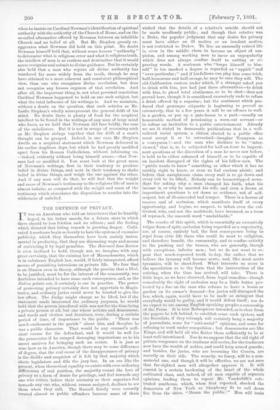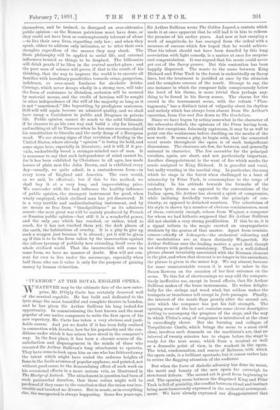THE DEFENCE OF PRIVACY.
IT was an American who told an interviewer that be humbly hoped, in his better moods, for a future state in which there should be less friction and no editors ; and the feeling which dictated that biting remark is growing deeper. Culti- vated Americans begin so keenly to hate the system of excessive publicity, which they themselves have been mainly instru- mental in producing, that they are discussing ways and means of restricting it by legal penalties. The Harvard Law Review is even inclined to hold, though not, we imagine; with any great certainty, that the existing law of Massachusetts, which is in substance English law, would, if fairly interpreted, afford means of punishing intrusions on private life. We fear that is an illusion even in theory, although the proviso that a libel, to be justified, must be for the interest of the community, was doubtless intended to have some such consequence, and, as the Nation, points out, it certainly is one in practice. The power of protecting privacy certainly does not appertain to Magis- trates, and ordinary juries could never be trusted to give the law effect. The Judge might charge as he liked, but if the statement made interested the ordinary juryman, he would hold that the person interfered with was not for the time being a private person at all, but one whose actions and demeanour, and words and clothes and furniture, were, during a certain period of time, of importance to the public. " There was much excitement in the parish" about him, and therefore he was a public character. That would be any counsel's suffi- cient excuse for the defendant, and it would be well for the prosecutor if he escaped damaging imputations as to his secret motives for bringing such an action. It is just as true here as in America, though there may be some difference of degree, that the real cause of the disappearance of privacy is the dislike and suspicion of it felt by that majority which elects legislators and fills the jury-box. In an era like the present, when theoretical equality co-exists with ever-widening differences of real position, the majority resent the love of privacy as a form of desire for privilege, and feel towards any one who retires before their curiosity as their superiors feel towards any one who, without reason assigned, declines to see them when they call. The Russell family were recently treated almost as public offenders because some of them
wished that the details of a relative's suicide should not be made needlessly public ; and though that relative was a Duke, the popular judgment that any desire for privacy must have either an ill motive or an insolent motive, is not restricted to Dukes. To live an unusually retired life is, even in the middle class, to become an object of sus- picion, and among working men to incur an unpopularity which does not always confine itself to cutting or re- proving words. A workman who "keeps himself to him- self " in too marked a degree is regarded as " uppish " and " over-particular ;" and if his fellows can play him some trick, half-humorous and half-savage, he may be sure they will. The old Californian custom under which, if a stranger asked you to drink with him, you had just three alternatives—to drink with him, to plead total abstinence, or to be shot—does not prevail here, though it is considered excessively rude to refuse a drink offered by a superior; but the sentiment which pro- duced that grotesque etiquette is beginning to prevail so extensively, that in a few years it will be an offence to wall- in a garden, or put up a gate-house to a park—usually an honourable method of pensioning a worn-out servant—or to refuse an invitation to a public entertainment. Already we see it stated in democratic publications that in a well- ordered social system, a citizen elected to a public office must accept it or be ostracised—imagine Tennyson as a vestryman !—and the man who declines to be " inter- viewed," that is, to be subjected for half-an-hour to imperti- nent questions at the discretion of a man he never saw before, is held to be either ashamed of himself, or to be capable of an insolent disregard of the rights of his fellow-men. The "public wants to know" something or other which it has no earthly right to know, or even to feel curious about; and before that unrighteous claim every wall is to go down and every veil to be lifted. Nobody can be horsewhipped nowa- days for asking why a man changed his faith, what his income is, or why he married his wife, and even a frown at impertinent questions is set down as evidence, not of self- respect, but of ill-concealed bad temper. There is a horror of reserve and of seclusion, which manifests itself at every opportunity, and begins, we suspect, to infect- even the cul- tivated, who, and not the multitude, have invented, as a term of reproach, the uncouth word " unclubbable."
The results of this spirit, which is essentially an excessively vulgar form of spite, seclusion being regarded as a superiority, are, of course, entirely bad, the first consequence being to repel from civic life those who could do most to enlighten, and therefore benefit, the community, and to confine activity to the pushing and the brazen, who are generally, though with exceptions, inferior men; but we do not want to re- peat that much-repeated truth to-day, the rather that we believe the tyranny will become acute, and, like most acute tyrannies, will be short-lived. What interests us more is the speculation as to the form that the insurrection of the retiring, when the time has arrived, will take. There is little hope, as we have observed, from legal remedies—though conceivably the right of seclusion may be a little better pro- tected by a fine on the man who refuses to leave a house or garden on its owner's demand—for juries will disregard the law, which, again, would have to be made so stringent that everybody would be guilty, and it would defeat itself ; nor do we expect to see among English-speaking peoples a censorship of the Press. It is true Robespierre intended, as is clear from the papers he left behind, to establish some such system, and the Socialists, if they triumph, will certainly hang a majority of journalists, some for " anti-social " opinions, and some for refusing to work under compulsion ; but democracies are like Kings, and will hold all who flatter them sufficiently to be at least well-intentioned. Nor do we suppose that the old right of private vengeance on the traducer will revive, for the traducers now have the wealth of nobles, and could keep armed guards ; and besides, the juries, who are becoming the Courts, are secretly on their side. The remedy, we fancy, will be a non- material one, and though it will be effective, we are not sure that far-sighted men will altogether approve it. It will consist in a certain hardening of the heart of the whole cultivated class, and, indeed, of all men capable of separate opinions, leading them to repeat Mr. Vanderbilt's cele- brated anathema, which, when first reported, shocked the democrats of New York as blasphemy fit to call down fire from the skies, " Damn the public " Men will train themselves, and be trained, to disregard an over-obtrusive public opinion—as the Roman patricians must have done, or they could not have been so contemptuously tolerant of abuse —to live their own lives, regarding only law ; and when they speak, either to address only intimates, or to utter their own thoughts regardless of the masses they may shock. The Stoic philosophy will be applied to social life, and external influences treated as things to be despised. The billionaire will drink pearls if he likes in the central market-place ; and the poor man of science will prove, if that is the result of his thinking, that the way to improve the world is to execute all families with hereditary proclivities towards crime, pauperism, indolence, or over-much fondness for alcoholic drinks. Courage, which never decays wholly in a strong race, will take the form of resistance to dictation, seclusion will be secured by material means, and the credit of heroism will be sought in utter independence of the will of the majority so long as it is not " sanctioned," like boycotting, by prodigious sentences. Self-will will again become an admired quality, and we shall have many a Coriolanus in public and Diogenes in private life. Public opinion cannot do much to the solid billionaire if he chooses to go his own way and build a city for himself, and nothing at all to Thoreau when he has once accommodated his constitution to biscuits and the early damp of a European wood. We see strong signs of that revulsion of feeling in the United States, where already " opinion " is losing its hold, and some signs here, especially in literature; and it will, if it pre- vails, undoubtedly breed a stronger-minded race of men. It is nonsense to say that such independence of mind cannot be, for it has been exhibited by Christians in all ages, has made heroes of plain men like John Brown, and is exhibited every day—usually, we quite admit, in a cantankerous form—in every town of England and America. The cure would, as we said, be effectual; but if this be the method, we shall buy it at a very long and impoverishing price. We surrender with the bad influence the healthy influence of public opinion, the strongest instrument for good, when wisely employed, which civilised man has yet discovered. It is a very terrible and undiscriminating instrument, and by no means so free from " bloodguiltiness " as its admirers assert—the next great war will be mainly produced by French or Russian public opinion—but still it is a wonderful power, and the only one which has reached, or rather, tried to reach, for it has not reached them yet, the dark places of the earth, the habitations of cruelty. It is a pity to give up 'such a weapon just because it is abused ; yet it will be given up if this is to be the form taken by the insurrection against 'the odious tyranny of publicity now extending itself over the whole civilised world. That the insurrection will come in some form, we have no manner of doubt. Men will not con- sent for ever to live under the microscope, especially when half those who use it value it only for the purpose of gaining ,money by human vivisection.











































 Previous page
Previous page